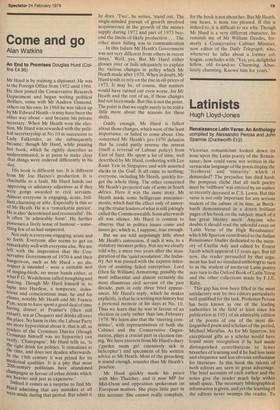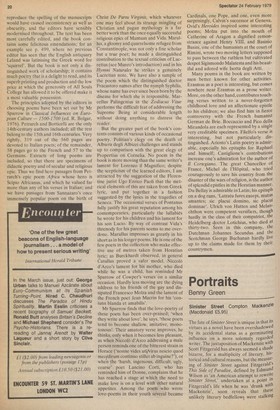Latinists
Hugh Lloyd-Jones
Renaissance Latin Verse: An Anthology compiled by Alessandro Perosa and John Sparrow (Duckworth £12) Victorian romanticism looked down its nose upon the Latin poetry of the Renais sance; how could verse not written in the vernacular language of the poets display the 'freshness' and 'sincerity' which it demanded? The prejudice has died hard; the pompous cliché that all such poetry must be 'stillborn' was uttered by an author so recently deceased as C.S. Lewis. But this verse is not only important for any serious student of the culture of its time, as Burckhardt demonstrated in a dozen brilliant pages of his book on the subject: much of it has great literary merit. Anyone who doubts it should read the splendid essay on 'Latin Verse of the High Renaissance' which Mr Sparrow contributed to the Italian Renaissance Studies dedicated to the memory of Cecilia Ady and edited by Ernest Jacob which appeared 15 years ago. But till now, the reader persuaded by that argument has had no standard anthology to turn to as the student of medieval Latin poetry may turn to the Oxford Book of Latin Verse and the other collections made by F.J.E. Raby.
This gap has now been filled in the most satisfactory way by two editors particularly well qualified for the task. Professor Perosa has been known as one of the leading authorities in the field at least since his publication in 1951 of an admirable edition of the poems of one of the most distinguished poets and scholars of the period, Michael Marullus. As for Mr Sparrow, his exceptional gifts as a scholar would have found more recognition if he had made distinguished contributions to fewer branches of learning and if he had less taste and eloquence and less obvious enthusiasm for literature. In this book the talents of both editors are seen to great advantage. The brief accounts of each author and the notes give the reader much help within small space. The necessary bibliographical information is given, and yet the learning of the editors never swamps the reader. To reproduce the spelling of the manuscripts would have caused inconsistency as well as obscurity, and the editors have sensibly modernised throughout. The text has been most carefully edited, and the book contains some felicitous emendations; for an example see p. 499, where no previous editor has seen that the English antiquary Leland was latinising the Greek word for 'squirrel'. But the book is not only a distinguished work of scholarship; it contains much poetry that is a delight to read, and its superb printing and production and the low price at which the generosity of All Souls College has allowed it to be offered make it a most valuable possession.
The principles adopted by the editors in choosing poems have been set out by Mr Sparrow in Classical Influences on European Culture — 1500-1700 (ed. R. Bolgar, 1976). Petrarch and Botticelli are the only 14th-century authors included; all the rest belong to the 15th and 16th centuries. Very rightly, 319 out of the 560 pages are devoted to Italian poets; of the remainder, 58 pages go to the French and 57 to the Germans. Extracts of long poems are included, so that there are specimens of didactic poetry and of secular and religious epic. Thus we find here passages from Pe trarch's epic poem Africa whose hero is Scipio Africanus, and which he valued far more than any of his verses in Italian; and we have passages from Sannazaro's once immensely popular poem on the birth of Christ De Partu Virginis, which whatever one may feel about its strange mingling of Christian and pagan mythology is a far better work than the once equally successful religious epics of Mantuan and Vida. Marullus, a gloomy and quarrelsome refugee from Constantinople, was not only a fine scholar but a true poet; he made a distinguished contribution to the textual criticism of Lucretius (see Munro's introduction) and in his Hymni Naturales he strikes a genuinely Lucretian note. We have also a sample of the poem which the distinguished doctor Fracastoro names after the nymph Syphilis, whose name has ever since been born by the disease for which she is responsible. Marcellus Palingenius in the Zodiacus Vitae performs the difficult feat of addressing the Supreme Being at considerable length without doing anything to distress the reader.
But the greater part of the book's contents consists of various kinds of occasional poetry. Politian's elegy on the death of Albiera degli Albizzi challenges and stands up to comparison with the great elegy of Propertius on Cornelia. No poem in the book is more moving than the same writer's lament for Lorenzo il Magnifico; despite the scepticism of the learned editors, I am attracted by the suggestion of the Florentine jurist Ugo Enrico Paoli that the metrical elements of this are taken from Greek lyric, and put together in a fashion suggested by the lyrics in the tragedies of Seneca. The occasional verses of Pontanus fully justify his great reputation among his contemporaries, particularly the lullabies he wrote for his children and his lament for his son Lucio. By way of contrast Vida's threnody for his parents seems to me overdone. Marullus impresses as greatly in his short as in his longer poems. He is one of the few poets in the collection who make effective use of metres taken from Horatian lyric; as Burckhardt observed, in general Catullus proved a safer model. NiccolO d'Arco's lament for his mother, who died while he was a child, has reminded Mr Sparrow of Cowper's verses on a similar occasion. Hardly less moving are the dying address to his friends of the gay and dissipated Francesco Molza and the lament of the French poet Jean Macrin for his 'coniunx blanda et amabilis'.
Mr Sparrow finds that the love-poetry of these poets has been over-praised; 'when they write about love', he says, 'these poets tend to become shallow, imitative, monotonous'. Their amatory verse improves, he thinks, only when it becomes less pleasant, as when Niccold d'Arco addressing a male person reminds one of the bitterest strain in Horace ('nonne vides utVvirus nescio quod meoidirum continuo stillet ab inguine?'), or when the 'harsh, ingenious, difficult, ugly, coarse' poet Lancino Corti, who has reminded him of Donne, complains that he has reached a stage at which the need to make love is on a level with other natural appetites. Among the poets who wrote love-poems in their youth several became Cardinals, one Pope, and one, even more surprisingly, Calvin's successor at Geneva. Ovid's Heroides inspired some interesting poems; Molza put into the mouth of Catherine of Aragon a dignified remonstrance against Henry VIII, and Basinio Basini, one of the humanists at the court of Rimini, wrote two moving letters supposed to pass between the ruthless but cultivated despot Sigismondo Malatesta and his beautiful and adored wife Isotta degli Atti.
Many poems in the book are written by men better known for other activities. Erasmus as a poet is interesting, but comes nowhere near Erasmus as a prose writer. More, on the other hand, contributes touching verses written to a never-forgotten childhood love and an affectionate epistle to his children; we also find him in fierce controversy with the French humanist German de Brie. Boccaccio and Pico della Mirandola are each represented by a single very creditable specimen. Filelfols verse is interesting, but not particularly distinguished. Ariosto's Latin poetry is admirable, especially his epitaphs for Raphael and himself; Castiglione's contributions increase one's admiration for the author of 11 Cortegiano. The great Chancellor of France, Michel de l'Hopital, who tried courageously to save his country from the disaster of the wars of religion, is the author of splendid epistles in the Horatian manner. Du Bellay is admirable in Latin; his epitaph on .a dog runs, Latratu fures ,excepi, mutus amantes; sic placui domino, sic placui dominae'. Ulrich von Hutten and Melanchthon were competent versifiers, though hardly in the class of their compatriot, the Heidelberg doctor Lotichius, who died at thirty-two. Seen in this company, the Dutchman Johannes Secundus and the Scotchman George Buchanan hardly live up to the claims made for them by their countrymen.



































 Previous page
Previous page